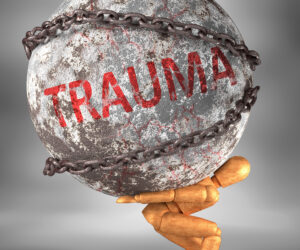When someone has been through a lot of hurt, it can change how they feel about themselves, others, and the world. Post-Traumatic Stress Disorder (PTSD) is not always caused by one big event. Sometimes, it happens after many painful experiences over time, like growing up in an unsafe home, being in an unhealthy relationship, or feeling scared for a long time. This kind of PTSD, called complex PTSD (C-PTSD), can make relationships feel confusing, scary, or overwhelming, even when love is there.
Trust Can Feel Hard
Example: Maria grew up in a home where her parents often broke promises and hurt her feelings. Now, as an adult, she struggles to believe that her husband truly cares for her. Even when he reassures her, she sometimes feels like he will eventually leave or betray her.
If someone was hurt by a parent, caregiver, or past partner, they may have learned that trusting people leads to pain. Even when they are in a safe and loving relationship, their brain might tell them to be careful. They may have trouble opening up, believing in their partner’s love, or feeling safe enough to rely on others.
Arguments Can Feel Unsafe
Example: When James and his wife have a disagreement, she raises her voice slightly. Even though she isn’t yelling at him, James suddenly feels scared and angry. Growing up, his father would yell before things became violent, so now any loud voice makes him feel like he’s in danger.
For some people with PTSD, disagreements don’t just feel uncomfortable—they feel dangerous. If they grew up around yelling or punishment, even small arguments can bring back fear. They may try to avoid conflict by staying silent, even when something is bothering them. Others might react with strong emotions, feeling overwhelmed by fear, sadness, or anger. Their partner may not understand why certain words or tones of voice feel so painful.
Sometimes, Feelings Get Shut Off
Example: Sarah used to be fun and full of energy, but after years of being in an abusive relationship, she now feels numb. Even though her new partner is kind and loving, she struggles to feel excitement or joy. She wants to feel close to him, but sometimes it’s easier to stay distant.
When people go through a lot of trauma, their brain tries to protect them by turning off big emotions. This is called emotional numbing. While this helps stop the pain, it can also make it hard to feel love, joy, or excitement. Their partner may feel like they are being pushed away, even though the person with PTSD cares deeply but just doesn’t know how to show it.
Always Being on High Alert
Example: Chris survived years of bullying at school, where he had to always be on guard. Now, even though he has a loving wife and a safe home, he still gets jumpy when someone walks up behind him or touches him unexpectedly. His body is always bracing for danger, even when there is none.
PTSD can make people feel like danger is always nearby, even when they are safe. Loud noises, sudden movements, or certain smells can bring back scary memories. They may feel anxious, have trouble sleeping, or always be on edge. This can make everyday life feel exhausting for both partners.
Fear of Being Left Behind
Example: Emily was abandoned by her parents as a child. Now, in her marriage, she worries constantly that her husband will leave her too. If he takes too long to reply to a text, she starts to panic, thinking that he must be angry or planning to leave.
People who have been abandoned or mistreated in the past may feel afraid that their partner will leave them, even if everything is okay. They might pull away first to protect themselves, or they might try to hold on too tightly. These fears are not their fault—they come from past wounds that still need healing.
Healing Together
A healthy relationship can be a safe place to heal. Here’s how both partners can support each other:
- Learn about PTSD – Understanding why certain reactions happen can make it easier to be patient and kind.
- Talk openly – Sharing feelings and fears can help both partners feel connected.
- Go to therapy – A trauma-informed therapist can help with healing, both individually and as a couple.
- Practice self-care – Both partners need to take care of their own emotional well-being, too.
Example: Kevin and his wife know that PTSD makes some parts of their relationship difficult. They take time to talk about feelings and triggers, and Kevin goes to therapy to work on his healing. His wife also sets healthy boundaries so that she can take care of herself while still supporting him.
PTSD is not a choice, and healing takes time. Love, patience, and understanding can help someone feel safe again. With the right support, relationships can become a place of comfort, connection, and healing.
